By Film Noir Blonde and Mike Wilmington
The Film Noir File is FNB’s guide to classic film noir, neo-noir and pre-noir on Turner Classic Movies (TCM). All movies below are from the schedule of TCM, which broadcasts them uncut and uninterrupted. The times are Eastern Standard and (Pacific Standard).
Pick of the Week:
“Out of the Past” (1947, Jacques Tourneur). 2 a.m. (11 p.m.). Thursday, July 24. With Robert Mitchum, Jane Greer and Kirk Douglas. Reviewed in FNB on Dec. 12, 2010. (See Tourneur‘s “Cat People” below, on Sunday.)
Wednesday July 23
8 p.m. (5 p.m.): “Bullitt” (1968, Peter Yates). With Steve McQueen, Jacqueline Bisset, Robert Vaughn and Robert Duvall. Reviewed in FNB on Oct. 27, 2012.
10:15 p.m. (7:15 p.m.): “The Treasure of the Sierra Madre” (1948, John Huston). With Humphrey Bogart, Walter Huston, Tim Holt, Alfonso Bedoya and Bruce Bennett. Reviewed in FNB on Nov. 31, 2012.
12:30 a.m. (9:30 p.m.): “Belle de Jour” (1967, Luis Bunuel). With Catherine Deneuve, Michel Piccoli, Jean Sorel and Genevieve Page. Reviewed in FNB on Aug. 8, 2013.
2:15 a.m. (11:15 p.m.): “Blowup” (1966: Michelangelo Antonioni). With David Hemmings, Vanessa Redgrave, Sarah Miles and The Yardbirds. Reviewed in FNB on June 19, 2014.
Thursday, July 24
2 a.m. (11 p.m.): “Out of the Past” See Pick of the Week.
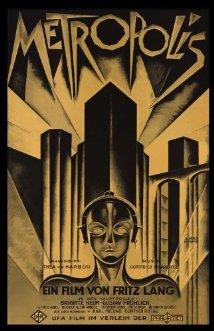 Saturday, July 26
Saturday, July 26
8 p.m. (5 p.m.): “Metropolis” (1927, Fritz Lang). With Brigitte Helm, Rudolf Klein-Rogge and Alfred Abel. Reviewed in FNB on May 29, 2014.
2:15 a.m. (11:15 p.m.): “Spider Baby” (1964, Jack Hill). An insane, incestuous, greed-crazed Southern family runs amok in a dilapidated, decaying mansion. One of the wildest and campiest of all the ’60s low-budget horror quickie noirs, with a plot that makes “Whatever Happened to Baby Jane?” look like “The Song of Bernadette.” Lon Chaney Jr., Sid Haig and Quinn K. Redeker costar.
Sunday, July 27
12:15 p.m. (9:15 a.m.): “The Ladykillers” (1955, Alexander Mackendrick) With Alec Guinness, Katie Johnson, Peter Sellers and Herbert Lom. Reviewed in FNB on July 31, 2013.
2 p.m. (11 a.m.): “Blackboard Jungle” (1955, Richard Brooks.) With Glenn Ford, Sidney Poitier, Anne Francis, and Vic Morrow. Reviewed in FNB on Apr. 18, 2013. In Memoriam: Paul Mazursky.
4 p.m. (1 p.m.): “Rebel Without a Cause” (1955, Nicholas Ray). With James Dean, Natalie Wood, Sal Mineo, Dennis Hopper and Jim Backus. Reviewed in FNB on Apr. 18, 2013.
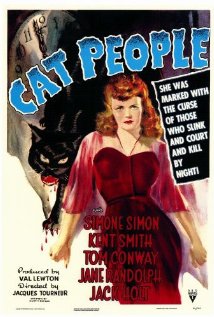 8 p.m. (5 p.m.): “Cat People” (1942, Jacques Tourneur). Subtle, moody, gently chilling, this low-budget RKO supernatural noir, about a foreign émigré (Simone Simon) – whose soul is coveted by a coven of cat people – is a poetic suspense movie in which the horrors are suggested rather than shown. It was the first of the legendary Val Lewton-produced literate fright classics. Scripted by DeWitt Bodeen; with Kent Smith and Tom Conway.
8 p.m. (5 p.m.): “Cat People” (1942, Jacques Tourneur). Subtle, moody, gently chilling, this low-budget RKO supernatural noir, about a foreign émigré (Simone Simon) – whose soul is coveted by a coven of cat people – is a poetic suspense movie in which the horrors are suggested rather than shown. It was the first of the legendary Val Lewton-produced literate fright classics. Scripted by DeWitt Bodeen; with Kent Smith and Tom Conway.
9:30 p.m. (6:30 p.m.): “The Curse of the Cat People” (1944, Robert Wise & Gunther von Fritsch). Producer Val Lewton’s sequel to the classic “Cat People,” with the spirit of the first film’s beautiful feline victim Simone Simon returning to bedazzle the child of her bereaved ex-husband (Kent Smith). Robert Wise’s directorial debut, and a good one. (Followed at 10:45 p.m. (7:45 p.m.), by the documentary “Martin Scorsese presents Val Lewton: The Man in the Shadows.”)
12:15 a.m. (9:15 p.m.): “Pandora’s Box” (1928, G. W. Pabst). With Louise Brooks, Fritz Rasp and Francis (Franz) Lederer. (Silent German Movie with music score.) Reviewed in FNB on Nov. 3, 2012.
2:45 a.m. (11:45 p.m.): “La Haine” (1995, Mathieu Kassovitz). Stylish, stark and violent black-and white drama of French juvenile delinquency in Paris and its suburban banlieues. With Vincent Cassel, Hubert Kounde and Said Taghmaoui. (In French with subtitles.)
Wednesday, July 30
8 p.m. (5 p.m.): “Detective Story” (1951, William Wyler). With Kirk Douglas, Eleanor Parker, William Bendix and Lee Grant. Reviewed in FNB on June 20, 2013.
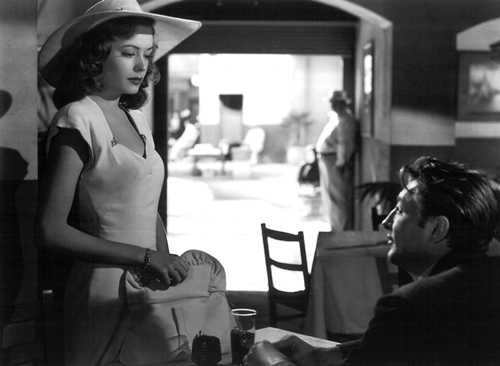





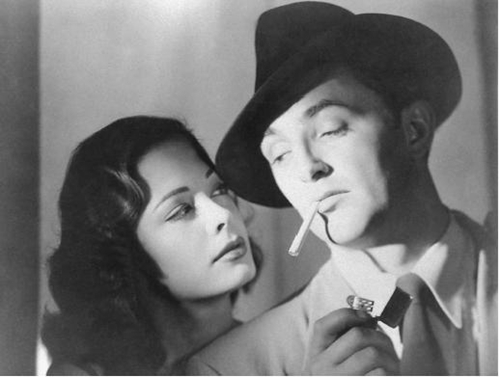
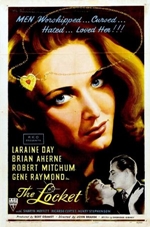
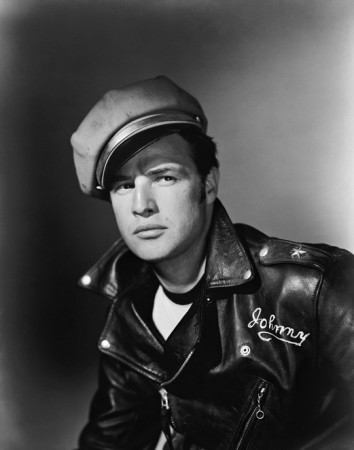

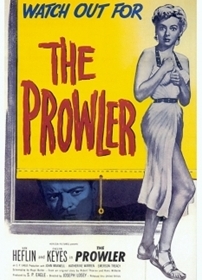
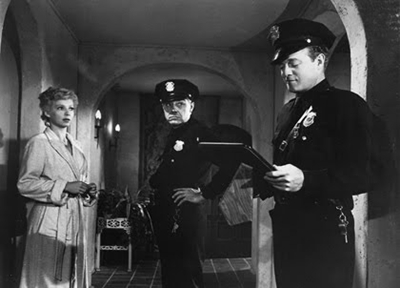
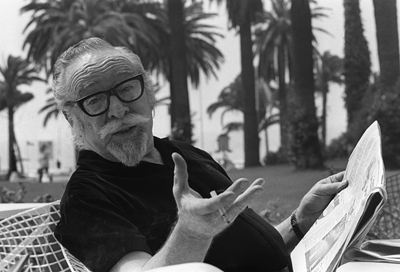
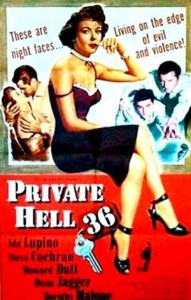
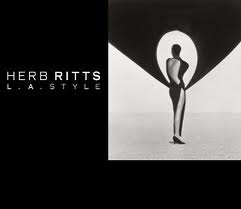
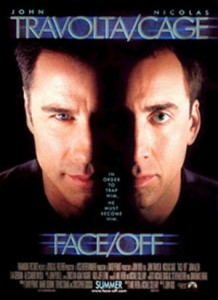
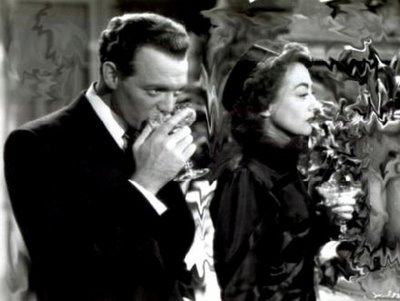
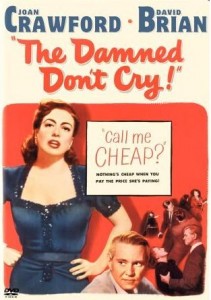
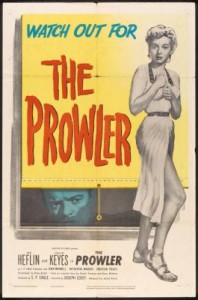
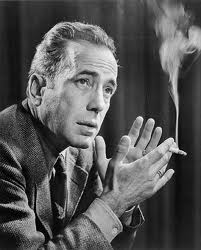
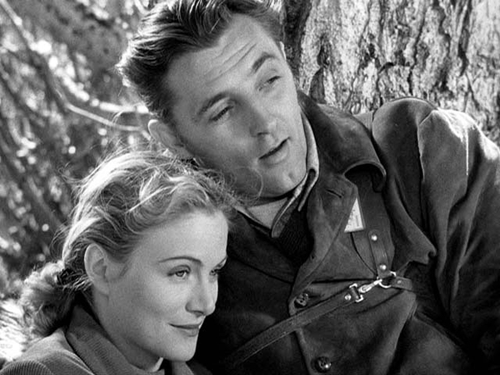

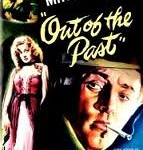





From FNB readers